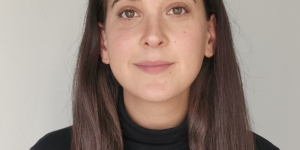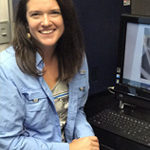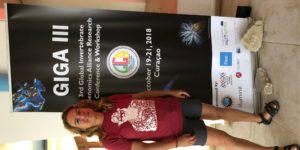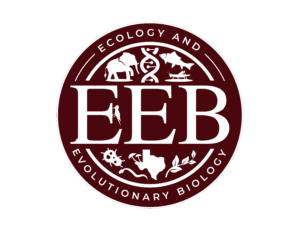Dr. Sheila Kitchen joined the EEB program Fall 2024. She is an Assistant Professor at Texas A&M University at Galveston in the Department of Marine Biology. As a trained molecular ecologist, she integrates field, laboratory and computational tools to address fundamental questions surrounding interspecies interactions and their persistence under climate change. Her goal is to transform these results into applied solutions for conservation. Her lab’s research is primarily focused on cnidarian (corals, sea anemones and jellyfish) – algal symbiosis and innate immunity of invertebrates. She is an active member of the Caribbean Coral Restoration Genetics Working Group as part of the Coral Restoration Consortium.
Spotlight: Vivienne Foroughirad
Dr. Vivienne Foroughirad joined the TAMUG Marine Biology Department and EEB program in 2024. Her current research is on the behavioral ecology of cetaceans, focusing on the factors shaping individual behavior and population-level social structures, and how these impact survival and reproduction across the lifespan. Much of her work comes from the long-term Shark Bay Dolphin Project in Australia, where she leverages multi-generational pedigrees of bottlenose dolphins to investigate mechanisms of inheritance of different behavioral phenotypes. She is additionally investigating how such long-lived, slow-reproducing species respond to climate change by examining the impact of marine heatwaves on dolphin behavior and reproduction.
Spotlight – MC Hannon
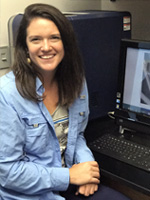 Her dissertation research focuses on the reproductive habits of a local species of polychaetes, the common clam worm. She is taking a four-pronged approach to get a comprehensive picture of what is occurring by using ecological, genetic, histological, and biomechanic tools.
Her dissertation research focuses on the reproductive habits of a local species of polychaetes, the common clam worm. She is taking a four-pronged approach to get a comprehensive picture of what is occurring by using ecological, genetic, histological, and biomechanic tools.
In her spare time, MC is very active and enjoys playing Ultimate Frisbee and going to a Crossfit gym (when conditions are safe). Fun fact: MC is an ordained minister in the state of Texas and officiated her first wedding earlier this year!
Dr. Anja Schulze and student attend GIGA III in Curacao
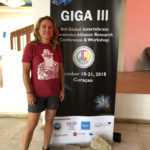 EEB core faculty member Dr. Anja Schulze (Associate Professor, Marine Biology, Texas A&M University Galveston Campus) and her Ph.D. student Candace Grimes recently attended the third meeting of the Global Invertebrate Genomics Alliance (GIGA III) on the beautiful island of Curaçao in the Netherlands Antilles. Not a bad place for a conference!
EEB core faculty member Dr. Anja Schulze (Associate Professor, Marine Biology, Texas A&M University Galveston Campus) and her Ph.D. student Candace Grimes recently attended the third meeting of the Global Invertebrate Genomics Alliance (GIGA III) on the beautiful island of Curaçao in the Netherlands Antilles. Not a bad place for a conference!
Candace used the opportunity to collect some of her study organisms on the local coral reefs. She will be examining the microbiomes of bearded fireworms (Hermodice carunculata) and some of the corals they eat to determine whether the worms could potentially be vectors for coral diseases. Fireworms tend to be abundant at disturbed reef sites throughout the eastern and western Atlantic. Although their feeding activity is likely not a primary factor in reef decline, it may accelerate the process and slow recovery.
Candace and Anja are also interested in the environmental tolerances of fireworms, specifically to oxygen depletion. At the GIGA III meeting, Candace presented some of her ongoing work on differential gene expression in H. carunculata in response to experimental exposure to different oxygen levels.
Visit Dr. Schulze’s lab Website to learn more about her research and students.
Spotlight: Zach Hancock
Zachary Hancock is a first year PhD student who received his undergraduate degree from Texas A&M University-Texarkana. There, his research focused on the ecology and distribution of littoral freshwater microcrustacea of the Suborder Cladocera.
He has a particular interest in the phenotypic response to environmental cues displayed by certain daphniids (cyclomorphosis). He is broadly interested in the evolution and phylogenetics of the branchiopods and malacostracans.


